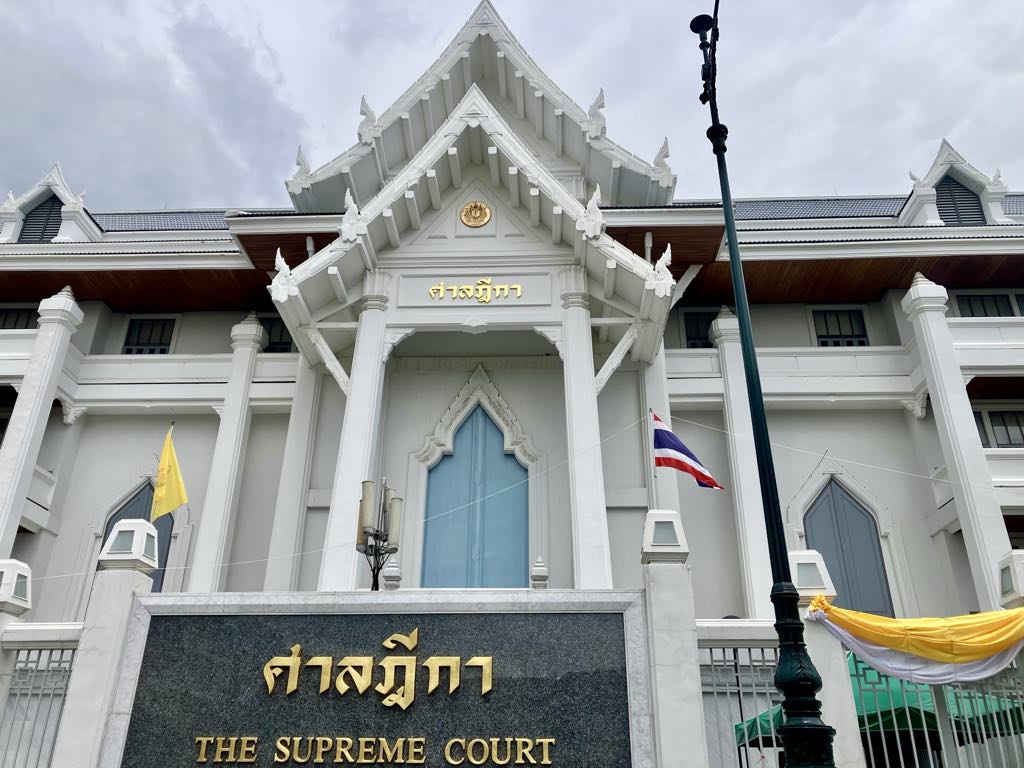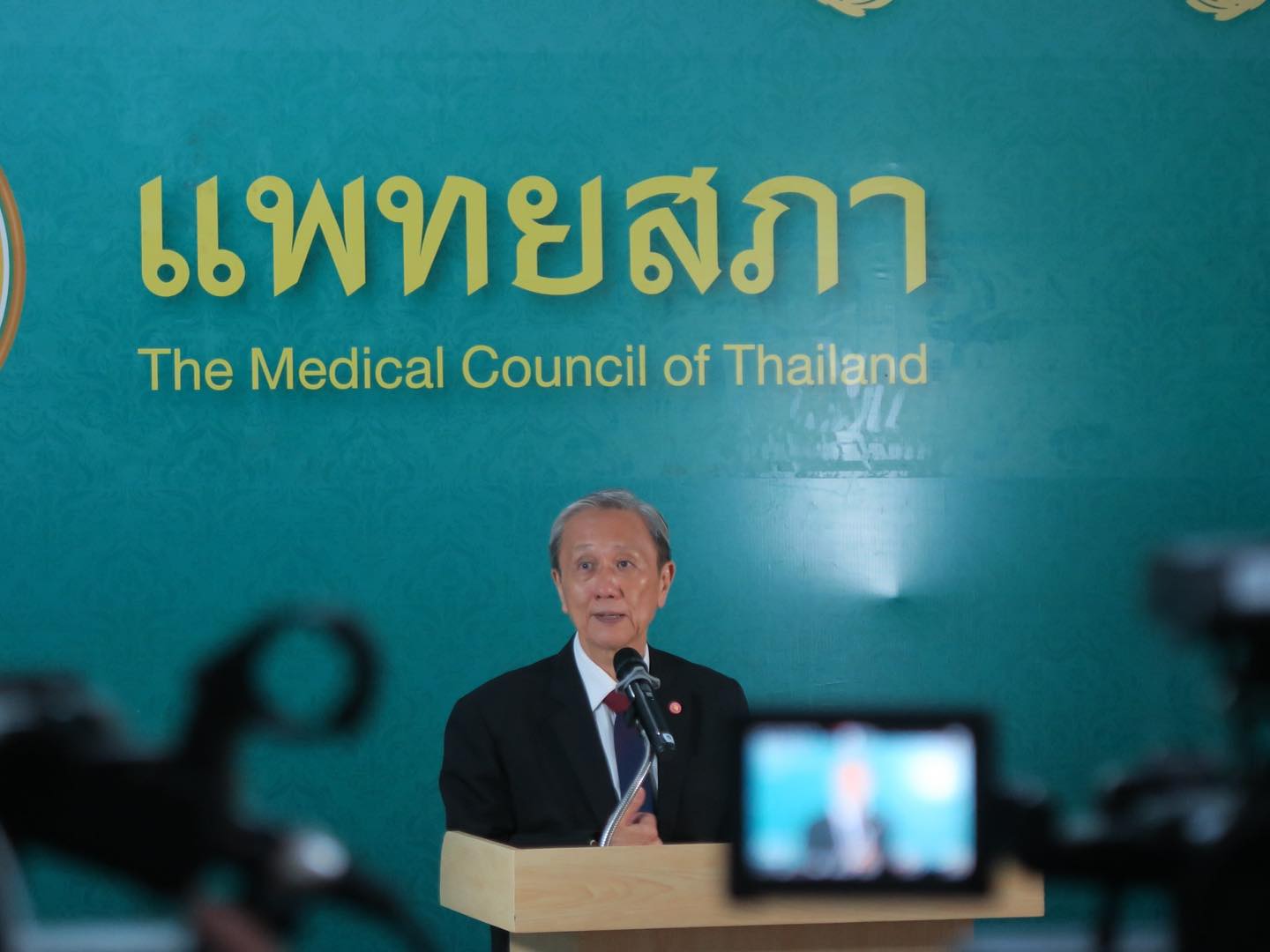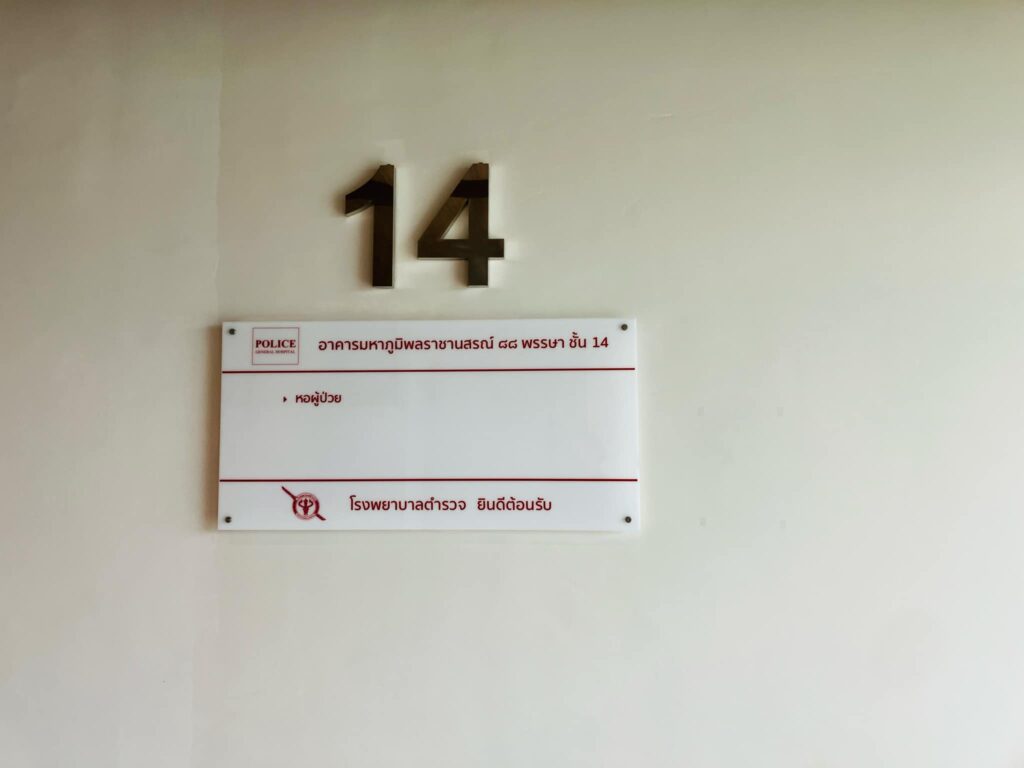The Supreme Court’s Criminal Division for Holders of Political Positions has wrapped up its hearings of witness testimony and ordered Thaksin Shinawatra, the former Prime Minister, and the Prison Superintendent of Bangkok Remand Prison, to appear in court on September 9 for its historic ruling
The Court has scheduled to rule on the “Thaksin’s 14th Floor” case this coming September 9, seen in the society as a historic one, as it will set a precedent for the country’s corrections enforcement following ultimate court rulings. The matter has been challenged for the first time by this case.
Mr. Thaksin was sentenced to eight years in prison for three corruption and malfeasance cases during his premiership, which he claimed were politically motivated. He was later granted a royal pardon for his service to the country after returning to Thailand from years-long self-exile and spending the first 10 days in hospital. This prompted his jail term to be reduced to one year.
On the night of August 22, the day he had arrived, he was transferred from the Bangkok Remand prison’s quarantine room and admitted to the Police General Hospital (PGH) after developing acute symptoms, including chest tightness, and had since reportedly stayed in the hospital on its 14th floor, dubbed as the VIP floor, for six months.
He was then granted parole one day before he left the hospital, and continued staying outside the prison at his residence for the rest of the next six months of his commuted one-year jail term. These treatments resulted in him never spending a single night in prison, raising public outcries over a double standard in the country’s corrections enforcement and justice delivery.
The Court, which has inquisitorial power, eventually took up the case to examine whether the corrections process and enforcement in his case were really implemented and completed following its ruling.
The Court had conducted seven hearings since June 13. The final session was conducted on Wednesday, in which Mr. Thaksin’s sole witness, the Cabinet’s long-time legal advisor and once a former Deputy PM in the Thaksin Government, Prof. Dr. Wissanu Krea-ngam, attended.
According to Mr. Thaksin’s lawyer team, Dr. Wissnu was invited to be Mr. Thaksin’s witness in this case because “he knew everything from the start, including his illness and preparations for his prison admission and related matters”. Dr. Wissanu, at that time, was in his final days in the Prayut government, acting as the Deputy PM and acting Justice Minister. The Prayut government left office on September 4, 2023.
The final session followed the sixth hearing, in which three honorable board members of the Medical Council of Thailand, including its first Vice President and former Dean of Siriraj Hospital’s Faculty of Medicine, Professor Emeritus Dr. Prasit Watanapa, attended as witnesses. (Read below)

The Court’s inquiry
The Court inquired into the preparations for prison admission and treatment of Mr. Thaksin at the Bangkok Remand Prison and provisions of medical care and treatment regarding his illness.
The Court reserved legal aspects to itself, and allowed only “facts” in the case to be examined at the hearing. It went into a length of details of Dr. Wissanu’s direct experiences at the prison, including the compounds that he saw and Mr. Thaksin’s conditions. The session lasted around 35 minutes in total.
According to the witness’s testimony, the government had actually prepared such preparations in advance a few times following news reports and speculations about Mr. Thaksin’s return plans, but they were dropped because of his cancellations.
According to BBC Thai, Mr. Thaksin first tweeted about his plan in early May 2023, stressing his wish to return home “to help raise his grandchildren”. The schedules were then changed at least four times before it happened on August 22, 2023.
According to the testimony, the witness knew about Mr. Thaksin’s final plan in short notice, again, from the media, but he managed to call for a meeting in preparation for Mr. Thaksin’s August 22 return with concerned officials including the Permanent Secretary of the Justice Ministry, the Correction Department’s Director General, the Prison Warden, the Corrections Department Hospital’s Director, and the senior Metropolitan Police officers.
The meeting was held at Government House. Another meeting was also held at the prison on the day Mr. Thaksin returned and was admitted to the prison.
During the preparations, the witness also went out to check for readiness on security and the prison at critical locations, along with concerned officials. Those included some high-rise buildings near the airport deemed to pose a security breach, some prison cells for “special cases”, and the Corrections Department Hospital to see where best to house Mr. Thaksin during his jail term. Some prominent figures who were sentenced to prison and regarded as “special cases” by the witness were mentioned at the hearing.
Medical care and treatment for Mr. Thaksin was also considered along with treatment outside the prison’s hospital, “as the concerned officials, including him, had to consider “every scenario” that could happen in Mr. Thaksin’s case”, according to the witness’s testimony. Hospital options near the prison were also considered, but after consulting with each other in the meeting, the Police Hospital became a priority as the prison had an MoU with it.
The consideration of Mr. Thaksin’s prison admission and treatment was considered with “some privilege” taken into account, according to the witness’s testimony. This is because of his former status as the country’s Prime Minister, the risk to life following his previous work as a Prime Minister, and his personal health problems.
The meeting discussed how to handle “special cases” with “special treatment” as commonly practised, but the officials insisted there was no such treatment existing, so Mr. Thaksin was treated “as commonly practised to other prisoners” by the prison, according to the witness’s claims in the testimony.
The encounter
According to the same testimony, he went to the Bangkok Remand Prison on the day that Mr. Thaksin was admitted and met him. He had a personal chat with him about his life and some of his underlying diseases in his quarantine room on the second floor before inviting other officials to join him afterwards. They had the second meeting to discuss their preparations again before separating.
According to the BBC Thai, Dr. Wissanu always rejected the notion that he had ever met Mr. Thaksin in prison. In the press interviews before Mr. Thaksin’s arrival, Dr. Wissanu had addressed Mr. Thaksin’s diseases reported to him by concerned officials. But at the hearing, he rejected his knowledge about this matter, claiming he did not see his medical records.
According to the witness’s testimony, Mr. Thaksin had also discussed with him about the pardon, but not the parole. However, he said he knew nothing about this and had had know idea up until this point how Mr. Thaksin proposed and got the pardon, as he only learned about it when he had received it on the way back on Sep 1. But according to the Criminal Code, the matter must be passed through a Justice Minister before reaching further figures concerned.
According to the witness’s testimony, Mr. Thaksin’s transfer and admission to the Police Hospital’s 14th Floor were also not in the plan. He learned about the matter when receiving a call from the Permanent Secretary around midnight, informing him about the transfer and admission. Mr. Thaksin even requested admission to another private hospital, but the witness did not approve.
The witness had never met Mr. Thaksin at the hospital, according to his testimony.
Asked by the National Anti-Corruption Commission’s representatives whether an offender who has recovered from his or her illness must be sent back to prison or not, he just briefly replied that it follows what is “commonly practised” by corrections officials, rejecting his knowledge about the ministerial regulation lining up procedures for periodical extensions for hospitalisation outside the prison for an offender, saying he did not draft it.






l The 14th Floor at the Police Hospital and the rooms reportedly hosting Mr. Thaksin during his claimed illness for six months. Photos: Bangkok Tribune
The professors’ views
On July 25, the Supreme Court’s Criminal Division for Holders of Political Positions held its sixth hearing, in which three honourable board members of the Medical Council of Thailand (MCT) attended as witnesses.
They were Professor Emeritus Dr. Prasit Watanapa, the MCT’s first Vice President and former Dean of Siriraj Hospital’s Faculty of Medicine; Assoc. Prof. Chairat Permpikul, President of the Royal College of Physicians of Thailand and a veteran critical care and pulmonary physician; and Prof. Keerati Chareancholvanich, President of the Royal College of Orthopaedic Surgeons of Thailand and a veteran orthopaedic physician.
The MCT comprises 70 members, who are deans of medicine schools and colleges nationwide, top officials at the Public Health and Defence Ministries, and elected members who are veteran physicians in all fields.
The Council had scrutinised the professional medical ethics and codes of conduct of some doctors in the case, and on May 8, it resolved to suspend the licences of two senior doctors at the Police Hospital for three and six months and issue a warning to another doctor at the Department of Corrections Hospital. They were all the witnesses in this case.
According to Prof. Dr. Prasit, during the press interview on May 8, “the facts the Council had obtained from the doctors concerned did not demonstrate “clear empirical evidence” that a critical state (of Mr. Thaksin’s illness) existed as claimed.”
The Council voted in the majority, more than 50 votes from 60 members who attended the meeting on May 8, to support the decisions made in the meeting. It’s vetoed by the Council’s President, Public Health Minister Somsak Thepsuthin, but the Council, again with almost all of the votes, 67 per 69, voted to support its previous resolutions, far beyond two thirds votes needed.
Mr. Somsak is a senior party listed PM of Phue Thai Party, a successor of Mr. Thaksin’s defunct Thai Rak Thai Party.
The Council provided its investigation report, documented in over 1,000 pages, along with the resolutions and decisions to the Court. Prof. Dr. Prasit additionally provided to the Court his summary of the timeline and descriptions of Mr. Thaksin’s illnesses, as well as medical treatments and care for him over the six months since he first arrived and was admitted to the prison.

At the hearing, the Court asked the professors to look into the MCT’s resolutions and decisions, as well as the expert opinions about Mr. Thaksin’s critical diseases that had been used to accompany the MCT’s consideration during its investigation into the doctors’ ethics. It asked them to explain those decisions and opinions in more detail.
The Court also asked the professors to look into the notes of the doctor at the DC hospital who had examined his health and the nurse who took care of Mr. Thaksin, the notes and progress notes of the nurses and doctors at the Police Hospital, the medical certificates used to accompany the extensions of his hospital stay periods at the Police Hosital, as well as the medical bills allegedly paid by Mr. Thaksin.
Last not not least were the doctors’ order notes that the doctors from the Police Hospital failed to submit to the Court, prompting it to request the submission of these documents from them again when they appeared in court as witnesses at the fifth hearing. The documents are written instructions from doctors detailing the medical care and treatment plans for a patient. These can include medication prescriptions, diagnostic tests, or other interventions issued daily and therefore cannot be fabricated.
The Court asked the professors to give their views and justifications based on medical standards of practice over Mr. Thaksin’s illnesses and diseases, as well as medical treatments and care provided to him over those six months.
After reviewing those documents, around 40-50 minutes each, they concluded in the same way that Mr. Thaksin’s illnesses and symptoms, as reported periodically in those documents, were not “critical or an emergency”, and the medical treatments and care provided to him did not correspond to his actual symptoms or degrees of urgency.
According to the professors’ reviews, Mr. Thaksin had some “chronic” diseases, some of which needed further treatment. But key signs of life; be they heart rates, breathing counts, and blood Oxygen levels, were almost stable as measured every four hours during his admission at the prison, except for his blood pressure, which was slightly higher than usual at night.
The acute symptoms he had developed at the prison that night, as reported publicly by the Corrections Department, included high blood pressure, hypoxemia and chest tightness. They were claimed by the nurse and the doctors at the prison to transfer him to the Police Hospital, citing the under-capacity of the Department of Corrections Hospital to take his case.
And as he was transferred and admitted to the Police Hospital on the night of August 22, he was not straightforwardly sent to the Emergency Room or ICU or CCU units for a cardiovascular disease as suspected, but straight to the 14th Floor, where he had received medicines and treatments to relieve symptoms concerning blood pressure and the respiratory system instead. It was not a cardiac doctor who was called in to treat him, but a neurologist, who claimed to be on night shift duty.
His symptoms were reported to have relieved just the day after, and the symptoms suspected to suggest the cardiovascular disease had also gone on the second day in the hospital, or August 24. And after the examination of his heart condition, which was two days late, it’s not abnormal beyond what was previously reported in his medical records from overseas.
The rest of the illnesses during the first few months in the Police Hospital were not directly related to his chronic diseases. They were injuries of his finger and shoulder that could be treated as outpatient cases even they needed surgeries, according to the professors.
So, they concluded that there was no need for him to prolong his stay in the hospital as had happened and could go back home, in this case, the prison — since the first few days of his admission at the Police Hospital, or for most, a week or so for recovery from the surgeries of the external organs involved.
Also read: Thaksin’s actual illness revealed in fifth hearing of “Thaksin’s 14th Floor” case
Indie • in-depth online news agency
to “bridge the gap” and “connect the dots” with critical and constructive minds on development and environmental policies in Thailand and the Mekong region; to deliver meaningful messages and create the big picture critical to public understanding and decision-making, thus truly being the public’s critical voice


